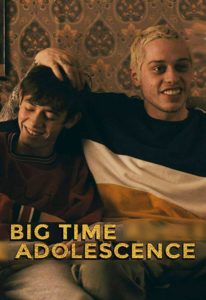
BIG TIME ADOLESCENCE
Starring: Pete Davidson, Griffin Gluck, Emily Arlook, Colson Baker, Sydney Sweeney, Jon Cryer, Oona Laurence
Directed & Written by Jason Orley
Studio: NEON
Shortly after finishing Big Time Adolescence (2020), a friend and I argued for 20 minutes about Pete Davidson’s character. Davidson plays Zeke Presanti, a good-natured, largely self-serving 20-something druggie who mentors an insecure 16-year-old as a means of reliving high school. The film acts as a cautionary tale: multiple characters articulate the pitfalls of Zeke’s lifestyle. Zeke clings to the past like a tattooed version of Jay Gatsby—with a beer-stained house instead of a mansion—and Mo, Zeke’s teen protégé, instead of a green light. My friend believes that we should pity Zeke.
I disagree.
The Plot
Big Time Adolescence has the coming-of-age sincerity of Boyhood (2014), the absurd wit of Good Boys (2019), and the cringeworthy clumsiness found in Bo Burnham’s Eighth Grade (2018). Still, writer and director Jason Orley chose to focus on a unique aspect of pre-graduation bildungsroman narratives: the hazards of idolizing others. Monroe “Mo” Harris, portrayed beautifully by Griffin Gluck, is a seemingly smart teen, but he misguidedly latches onto Zeke in the film opening scenes—and he doesn’t want to let go. As the film progresses, audiences realize that perhaps the relationship is symbiotic, in a two-lost-souls sort of way.
Zeke’s charm is both indefinite and instantly recognizable. In an episode of NBC’s Community (2009-2015), Britta (a sympathetically graceless primary character) succumbs (once again) to the mysterious allure of a passing character named Blade. Blade is a carnival employee who, as it turns out, has lost his ability to feel shame. He feels no need to impress anyone, so people are drawn to him the same way that cat owners are drawn to emotionally withholding cats. Those who seem disaffected seem fascinating—at least for a time. This is the appeal of Zeke in Big Time Adolescence.
Zeke seems untouchable because, relative to most people, he does not care about problems, consequences, or feelings. Zeke allegedly peaked in high school, and he lives each post-graduation day as if he can easily recapture past feelings of superiority. This causes problems. According to the movie, the trait that draws people to Zeke is the very trait that eventually pushes them away.
Writing and Acting
Orley’s writing is solid, and the actors skillfully bring it to (sometimes uncomfortable) life. Davidson treats each gag like an inside joke, and the younger actors, especially Gluck and Laurence, deliver their lines with the type of sincerity exclusive to teens at basement parties—somehow inorganic, forced, and entirely genuine at the same time. At times, the movie seems aimless, but even the film’s occasional aimlessness works as a representation of Zeke’s inability to actually try. Zeke has a lot of ideas, but he rarely acts on them. There are several subtle, quickly passing moments—written well by Orley and delivered brilliantly by Davidson—when Zeke senses the gravity of his plateaued reality. These moments add a great deal of heart to the film.
Orley seems unwilling to explore some of the larger emotional and interpersonal byproducts of misguided idolizing. This makes the film feel, at times, either tunnel-visioned or notably streamlined. Either way, the sleekness of the story highlights the fact that Davidson’s performance far outshines the rest of the film, which is one of the film’s few notable flaws. Mo and the others characters have so much to say—Jon Cryer gives a fascinating performance as Mo’s father—but Davidson steals attention at every moment (To be fair, attention-grabbing is Zeke’s modus operandi, so Davidson cannot be blamed. Still, a more balanced film would have been a more impactful film).
Conclusion
Zeke Presanti is not entirely like Jay Gatsby. Gatsby does not share Zeke’s disaffected feelings about life (that it’s all “scribbles and d**ks”). But both characters operate under the assumption that they can exist in the past, that looking backward is an effective way to move forward. Both characters suffer because of that belief.
Mo’s problem (naively idolizing a symbol of stagnation) and Zeke’s problem (allowing himself to stagnate) are more universal than we want to admit. The film is kind enough to resist the urge to rub our noses in the fact that many of us—regardless of age—are just like Mo or Zeke. It is telling that the film does not really let us know how their lives turn out. I guess it’s only human nature. Most people are, as Nick Carraway says, “boats against the current, borne back ceaselessly into the past.” Big time. I recommend this movie because of its humor, its acting, and its relatability.
Big Time Adolescence
Credits
- Pete Davidson's wit.
- One of Jon Cryer's best moments as an actor.
- Several laugh-out-loud moments.
- Focused narrative.
- Perfect soundtrack.
Credits (cont)
- Almost too much Pete Davidson.
- Too much like looking in a mirror for some viewers.
- May spark Gatsby-esque existential crisis.
- Missed opportunity to explore relationship dynamics.
- Some notably creepy moments.



![[PREVIEW] THE FUTURE IMPERFECT ARRIVES IN ‘MAESTRO #1’](https://geekd-out.com/wp-content/uploads/2020/08/1-2-150x150.png)
